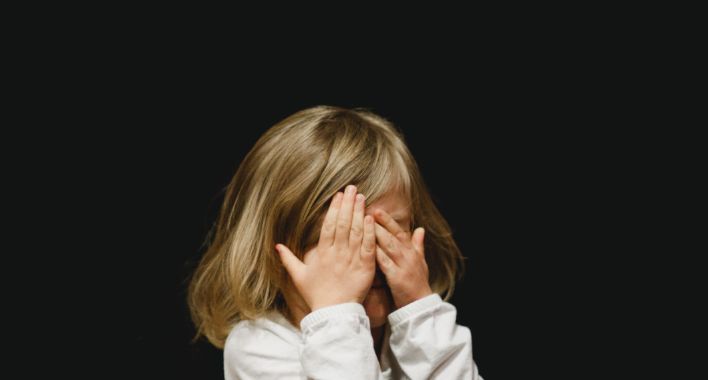Cringing is a colloquial label used to denote an emotion, of the family of embarrassment, but with some peculiarities. It is the feeling of discomfort, inadequacy, embarrassment, rejection and disapproval that we feel in our own skin before an act of another person that we consider laughable, deplorable or pathetic.
In other words, someone does something humiliating and, regardless of how that person feels about it, we feel “the same shame” as if it were us who were doing it and someone was making us look bad. This is basically what we experience when we see another person making a fool of themselves in front of us and we feel uncomfortable about it.

Generally speaking, anyone can feel this emotion but they will do so to a greater extent, or more often, the lower their particular threshold of what is embarrassing or not. In other words, the more things in the world that they consider to be pathetic or embarrassing. On the contrary, the more liberal and compassionate a person is, the less he or she will experience shame from others.
A Useful Emotion
Human beings are relational beings, we build ourselves and live in relationship with others, communicating with others, in a permanent interaction with others. We are all an influence on other people, we act as role models or references, both good and bad. Furthermore, our system for learning – for instance, for learning what to do or not to do in society – is not only fed by what others tell us to do, but also by what we see others doing and what we see happening to others when they do certain things.
Cringe is the discomfort we feel when someone does something pathetic or inappropriateAlthough it may not be right to admit it, in reality it is essential for life in society that we judge the conduct of others. We need to analyze it and draw a conclusion as to whether it is appropriate or not, whether it is reprehensible or not, even whether it is ridiculous or not. If we did not have this capacity, we would not be able to be disgusted by what we consider unjust, or we would not put any restraint on the public behavior of others or on our own. Coexistence, in that case, would be unmanageable.
It is clear that what is shameful or not (what we consider ridiculous, pathetic, or reprehensible) is relative: shame is not a “basic” emotion but rather a very cultural one, very much learned, and it appears precisely with this function of containing certain behaviors. This varies from person to person, from culture to culture, according to the criteria of what is acceptable and not, which obviously change, are not absolute.
On the other hand, it is possible to think that the fact of feeling cringe in certain situations has a protective function of what in psychology we call our self, our ego, that is, our identity: if I am capable of detecting in other pathetic behaviors, judging them as such and feeling discomfort, then it means that I am not like them, that I would not do it, that I am capable of distinguishing what is right from what is wrong and that, therefore, I am more worthy or decent in that sense.
The so-called cringe is not the only emotion that sometimes has this “protective” function, in the sense of providing us with a positive image of ourselves. Guilt can also be a factor: if I don’t feel guilty for having done something wrong… what kind of person am I? On the contrary, if I feel guilty then that means that, although I have made a mistake, I am a good person, I have a sufficient sense of morality.
In order to feel cringe, it is not necessary to physically witness the scene in question, nor that it is real. Cringing is an emotion that, like all others, we can feel while watching a movie or a television report.
It is normal that real life (analogical) generates in us more powerful emotions than what we can see on a screen. For example: seeing a dead body live has nothing to do with seeing a dead body on a news programme, even if the image is “the same” and lasts the same time. However, we are perfectly capable of feeling uncomfortable about something we see in a movie, feeling averse to inappropriate or pathetic behavior, wanting it to stop, or feeling that it is wrong, and the person is degrading himself by doing that.
The opposite of empathy
Cringe should not be confused with empathy. It has in common with empathy the fact that both are activated by what happens to another person, so that we feel in our own skin the emotions that others are feeling or should feel.
As always, it is important to speak accurately: shame (of others and of oneself) is an emotion that, as with all other emotions, does not necessarily have to be accompanied by any verbal or non-verbal expression or behavior: we can experience it privately without anyone knowing and without doing anything about it.

Nor should the shame be equated with mockery. Shame is an emotion related to discomfort and disapproval of someone else’s allegedly laughable or pathetic behavior and, as we have said, can be lived privately. Mockery is a behavior, something external and perceptible, something we do, not something we feel: I make fun of someone when I verbally or with my gestures humiliate that person. In other words, mockery usually implies some degree of shame on others, while not always when we feel shame on others will we make fun of someone.
Cringe is not always accompanied by mockery: we can feel it privately and without anyone knowing itOn the other hand, empathy is neither a feeling nor an emotion, but something more complex: it consists of detecting what the other needs, mainly at a relational level, and, in addition, responding to it to the extent of our possibilities. That is to say, empathy necessarily implies a movement, a gesture, a behavior, some words as a response to that which we have detected in the person. It is not only about putting myself in your skin and realizing what happens to you: that is being intuitive, not empathic. Empathy is that I act accordingly from what I detect that you need.
Cringing, by definition, involves judging and disapproving of a person’s behavior. On the contrary, empathy implies responding to a relational need of another, repairing that gap to some extent. In this sense, they have nothing to do with each other: feeling shame towards someone alienates us from that person, while empathy brings us closer to him or her and promotes a good relationship between the two.


